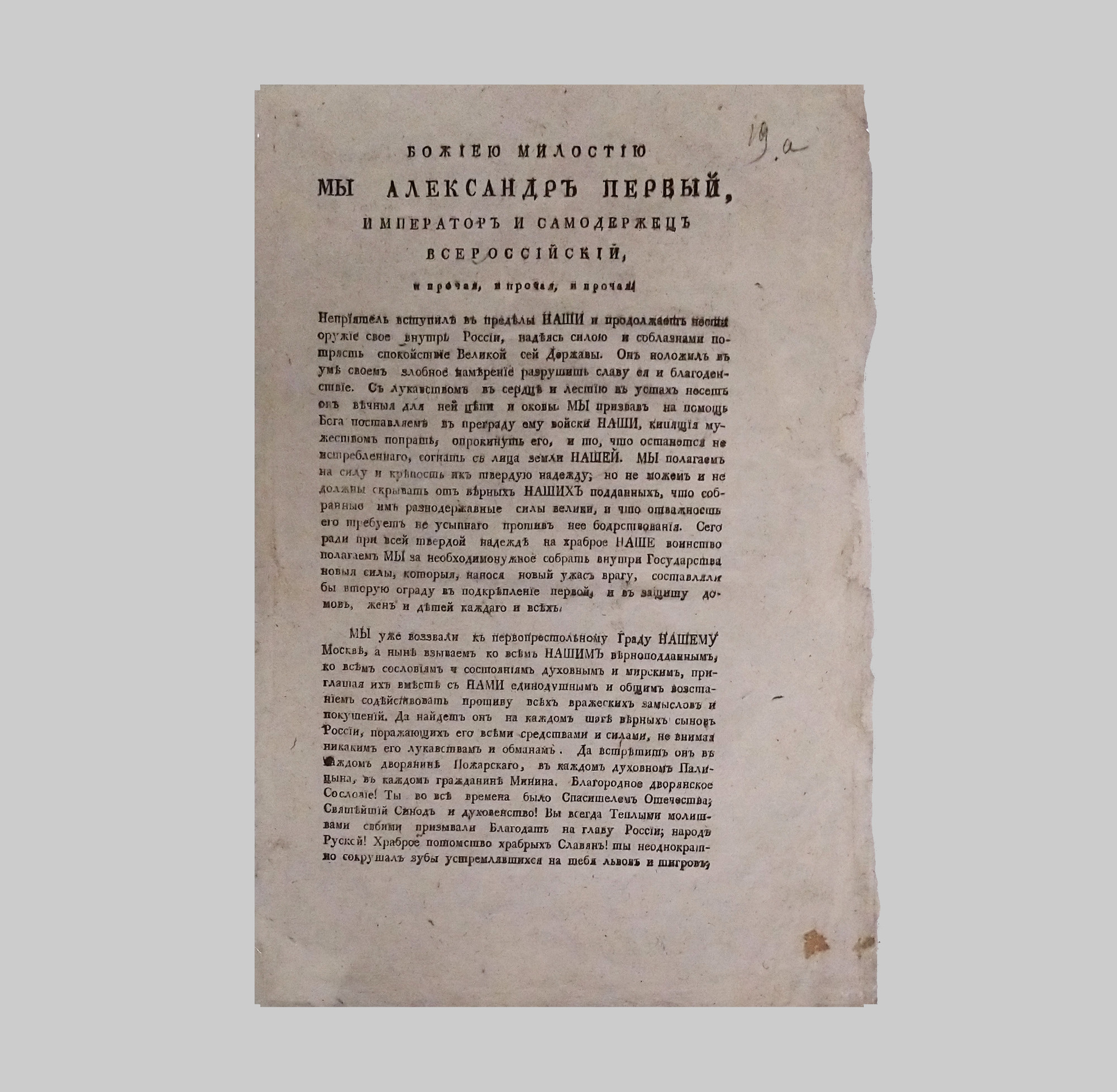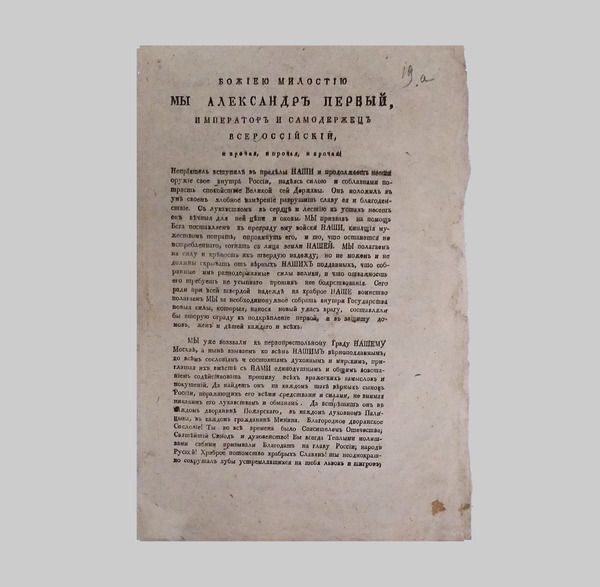The Manifesto about Defence of Motherland and Creation of Volunteer Army was signed by Emperor Alexander I on the 6th of July 1812 in a camp of the First Western Army which was near Polotsk. Four days later on the 4th of July the document was printed in St. Petersburg and distributed in the cities of the Russian Empire. The Manifesto urged people to join the Volunteer Army and nobility to take part in its formation and supply.
Special Committee for the leadership of the Volunteer Army headed by Aleksey Andreevich Arakcheev, Chairman of the Department of the Military Affairs of the State Council was established at the end of July. The numerical force and the structure of the local Volunteer Army were defined, their leaders and commanders were chosen in all the provinces of the country. Each unit got its own banner which differed from the one accepted in the army.
The Volunteer Army didn’t have the unified uniform. In the regions, which were not affected bythe war, they tried to dress volunteers in a specially designed uniform, which was different in different provinces. It was based on a folk costume and sewn of unpainted peasant cloth. On the territories, which were occupied by French troops where they didn’t have time to sew the uniform, defenders were dressed in common clothes. The identification marks of the members of the squads were a brass cross with an inscription ‘For Faith and Tsar’ and Emperor’s monogram, which was worn on a hat.
Totally, there were more than three hundred thousand people in the Volunteer Army in 1812. Representatives of nobility and merchants responded to the call of the Manifesto, they outfit and armed whole regiments at their own expense, donated about ten million roubles to the treasury to “help the Motherland”. Clergy also made a significant contribution in the organisation of the Volunteer Army financial supply. To support the Manifesto, the Holy Synod issued a proclamation about gathering new forces for fighting against the French invasion.
The Church united and consolidated people of the Russian Empire in their resistance to the enemy, proclaimed fairness of the liberation war, strengthened patriotism and national unity. Regimental priests carried out special tasks: they cultivated patience, courage, ability to self-sacrifice, loyalty and love to the Motherland and Emperor among soldiers. Military clergy boosted the morale of the regular army and parish clergy energetically helped the liberation movement on the occupied territory. To join it, became a duty for each Russian man. The war became Patriotic indeed.
Special Committee for the leadership of the Volunteer Army headed by Aleksey Andreevich Arakcheev, Chairman of the Department of the Military Affairs of the State Council was established at the end of July. The numerical force and the structure of the local Volunteer Army were defined, their leaders and commanders were chosen in all the provinces of the country. Each unit got its own banner which differed from the one accepted in the army.
The Volunteer Army didn’t have the unified uniform. In the regions, which were not affected bythe war, they tried to dress volunteers in a specially designed uniform, which was different in different provinces. It was based on a folk costume and sewn of unpainted peasant cloth. On the territories, which were occupied by French troops where they didn’t have time to sew the uniform, defenders were dressed in common clothes. The identification marks of the members of the squads were a brass cross with an inscription ‘For Faith and Tsar’ and Emperor’s monogram, which was worn on a hat.
Totally, there were more than three hundred thousand people in the Volunteer Army in 1812. Representatives of nobility and merchants responded to the call of the Manifesto, they outfit and armed whole regiments at their own expense, donated about ten million roubles to the treasury to “help the Motherland”. Clergy also made a significant contribution in the organisation of the Volunteer Army financial supply. To support the Manifesto, the Holy Synod issued a proclamation about gathering new forces for fighting against the French invasion.
The Church united and consolidated people of the Russian Empire in their resistance to the enemy, proclaimed fairness of the liberation war, strengthened patriotism and national unity. Regimental priests carried out special tasks: they cultivated patience, courage, ability to self-sacrifice, loyalty and love to the Motherland and Emperor among soldiers. Military clergy boosted the morale of the regular army and parish clergy energetically helped the liberation movement on the occupied territory. To join it, became a duty for each Russian man. The war became Patriotic indeed.



